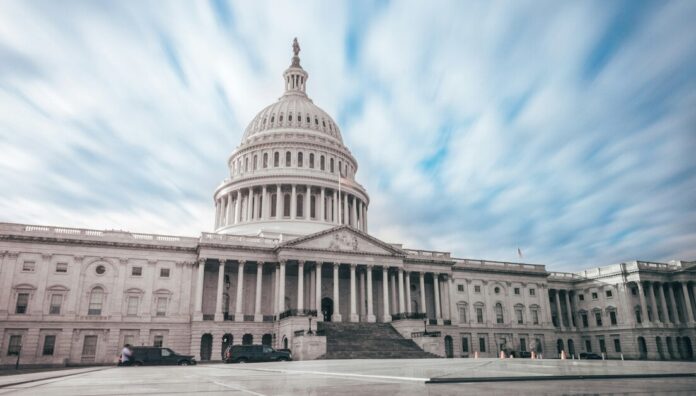The US Senate dealt a blow to the technology sector early on Tuesday (July 1), voting 99-1 to strip a provision from President Donald Trump’s economic package that would have prevented states from regulating artificial intelligence for a decade.
The rejection signals a victory to creative industry groups that have campaigned against what they see as an attempt to shield AI companies from accountability when using creators’ art and music to create AI models.
The proposal emerged from concerns that a “patchwork” of state and local AI laws would hinder American AI companies competing against China. Senator Ted Cruz of Texas, who chairs the Commerce Committee, proposed the measure after securing backing from tech leaders.
Initially designed as a 10-year ban on state AI oversight, Cruz and other lawmakers worked to secure that the provision is included in Trump’s GOP megabill. Supporters of the proposal include OpenAI’s Sam Altman, Anduril’s Palmer Luckey, and a16z’s Marc Andreessen, according to TechCrunch.
“People will be at risk until basic rules ensuring safety and fairness can go into effect.”
Sarah Huckabee Sanders, Governor of Arkansas
However, the proposal drew opposition as further details emerged. Arkansas Governor Sarah Huckabee Sanders, Trump’s former press secretary, rallied Republican governors against the measure, writing to Senate Majority Leader John Thune and Speaker of the House of Representatives Mike Johnson last week to remove the AI regulatory moratorium.
Sanders wrote: “People will be at risk until basic rules ensuring safety and fairness can go into effect.”
Senator Marsha Blackburn of Tennessee, who initially supported the moratorium, ultimately partnered with Washington Democrat Maria Cantwell to kill the provision entirely.
Despite Cruz and Blackburn teaming up to pitch changes to the AI moratiorium including shortening the timeframe to five years, Blackburn pullled her support, citing “problems with the language” of the amendment.
“While I appreciate Chairman Cruz’s efforts to find acceptable language that allows states to protect their citizens from the abuses of AI, the current language is not acceptable to those who need these protections the most.”
Marsha Blackburn, US Senator
Blackburn on Tuesday said: “While I appreciate Chairman Cruz’s efforts to find acceptable language that allows states to protect their citizens from the abuses of AI, the current language is not acceptable to those who need these protections the most.”
“When I spoke to President Trump last night, he said it was a terrific agreement… But outside interests opposed that deal.”
Ted Cruz, US Senator
Cruz suggested the bill could have “passed easily” if Blackburn hadn’t withdrawn her support.
“When I spoke to President Trump last night, he said it was a terrific agreement,” Cruz was quoted by the Associated Press as saying. “The agreement protected kids and protected the rights of creative artists. But outside interests opposed that deal.”
The Human Artistry Campaign — which represents recording artists, songwriters, composers, publishers, independent record labels, journalists, photographers, actors, athletes and more — welcomed the decision, arguing that the ban would have prevented states from requiring transparency about whose artistic works train AI models and from blocking unauthorized deepfakes.
“This dangerous and unwise proposal would have banned states from passing new legislation or enforcing existing laws, including to provide greater transparency about whose art was copied to create AI models and banning nonconsensual deepfakes and voice clones.”
Human Artistry Campaign
Following the vote, the campaign said in a statement to MBW: “The Human Artistry Campaign is grateful to Senators Blackburn and Cantwell for their steadfast support and applauds the Senate’s resounding rejection of AI without guardrails. This dangerous and unwise proposal would have banned states from passing new legislation or enforcing existing laws, including to provide greater transparency about whose art was copied to create AI models and banning nonconsensual deepfakes and voice clones. There is a better way forward with policies that recognize AI could be a valuable tool aiding human creativity, but should never be used to destroy artistry and culture.”
Mitch Glazier, Chairman and CEO of the Recording Industry Association of America, also welcomed the news, telling MBW: “We applaud Senators Blackburn and Cantwell for their persistent leadership to protect artists and rightsholders – driving a nearly unanimous Senate rejection of a proposed 10-year ban on state-based AI guardrails.”
“This final vote is a resounding dismissal of the shortsighted, zero-sum game thinking from some tech companies and signifies a widespread recognition that respect for human creativity does not impede winning the AI race, but instead is essential to its success.”
Mitch Glazier, RIAA
Added Glazier: “Federal and state governments both have a critical role to play in protecting creators while promoting AI innovation. This final vote is a resounding dismissal of the shortsighted, zero-sum game thinking from some tech companies and signifies a widespread recognition that respect for human creativity does not impede winning the AI race, but instead is essential to its success.”
The RIAA represents the US recording industry, whose members include major record labels and distributors.
Music Business Worldwide


